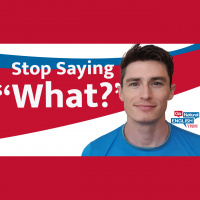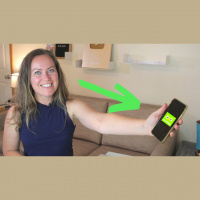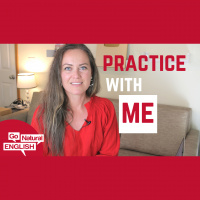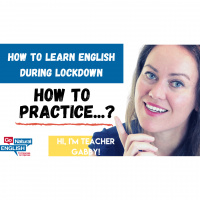Synopsis
Go Natural English helps you improve your English listening skills and fluency. The podcast will benefit intermediate to advanced learners most. Your English will benefit from language learning strategies that work, vocabulary and idioms, expressions, and phrasal verbs and how to make small talk and real conversation in American English. Learn special tips on American culture, how to listen to and speak with Americans. Join Gabby and the Go Natural English community to learn to speak American English like a fluent native!
Episodes
-
Let's talk about money - financial vocabulary you have to know
09/11/2020 Duration: 10minToday, I’m talking about financial vocabulary! Finance is basically the management of money, which is so important in everyone's life.
-
American English Tongue Twisters | Practice Speaking and Listening Skills
04/11/2020 Duration: 14minToday, I’m talking about Tongue Twisters!
-
How I Became Fluent in English
02/11/2020 Duration: 12minI am very excited to share my story about how I became fluent in English. What I am about to share with you is my personal experience. Not everyone reading this had the same experiences I did in the USA. My goal is to inspire you to make the changes you need that work for you to improve your English fluency.
-
Tips to Enhance your Vowel Pronunciation with Diphthongs
28/10/2020 Duration: 12minDid you know that the majority of what makes up a person’s accent are vowels? In fact, one of the most common problems English language learners have with English pronunciation is the vowels. In this lesson, we will be focusing on a particular subgroup of vowels called diphthongs and how improving your understanding and pronunciation of them can make a big difference in your competence and confidence in speaking English. I am willing to bet that anyone, from beginner to advanced English speakers, will learn something new from this! Follow along through the practice exercises as well!
-
Stop Saying "What?" How to Respond Better in English
26/10/2020 Duration: 08minHey there! So in today's lesson, we are gonna talk about hefud glarth min fingle schake! What? What?? Whaaaat?
-
Why is my English not improving?
21/10/2020 Duration: 16minAs an advanced or intermediate English learner, you may feel like you have hit a bump and your English is not improving.
-
How to Build Your Vocabulary in English, Even If You Have A Bad Memory
19/10/2020 Duration: 10minOne way we can have more fun with English and improve our English skills is to learn more vocabulary words! Not just read them or hear them, but actually KNOW them and know how to use them in conversation. If you want to be a more interesting English speaker, whether you’re a native or non-native English learner, vocabulary is the way to do that! How do we memorize more vocabulary words so that we can make them an active part of our own everyday conversations? Well, buckle up, hang on and come along for this video. I'm going to share several tips and strategies - ways that I have improved my own vocabulary in English, my own language, and other foreign languages that I have learned throughout the years. If we can help 10,000 learners download the Duolingo app, we're going to have a special live video next week on Thursday, October 29th! It will be a special Q&A and a special lesson. Make sure you click on the link below and help us to work towards this goal together, to improve o
-
5 Differences Between Canadian and American Pronunciation
14/10/2020 Duration: 10minHave you ever heard people talk about the “Canadian accent” and wondered what exactly that is? Maybe you’ve heard people talk about it in movies and TV shows like South Park, but weren’t quite sure what is real vs. what isn’t. As someone who has lived and is a citizen of both the US and Canada, as well as a self-admitted linguistics geek, I am here to give you the inside scoop into some of the differences in how Canadians and Americans talk. Whether you’ve moved to Canada and want to understand the culture and dialect a bit better, or if you, like me, enjoy guessing people’s nationality based on their accent, you have come to the right place!
-
Learn The "Secret" Informal English Contractions
12/10/2020 Duration: 10minInformal contractions, what are they? And why should you care about them? Hey! I'm Ryan, and today I'm talking about why you should care about the "secret" informal English contractions and how you can use them to help spice up your English, improve your fluency, and sound more natural! Most likely you won't find these in textbooks, but you might see them written in text messages, social media, or hear them in music and movies. Interested in learning more? Let's dive into it!
-
100 Common English Phrases for Natural Conversation
07/10/2020 Duration: 18minDid you know that majority of what native English speakers say every day are the same words and phrases over and over? With just these 100 most common phrases in American English conversations we are sharing today, you can speak English fluently! These phrases are for all levels of English speakers because they are found in daily conversations that you don't necessarily see in your textbook. Let's get started! Improve your listening and speaking skills with Lingoda! Join the Lingoda Team Challenge here: http://bit.ly/TheLingodaTeamChallenge_Gabby Your key name is: GONATURAL Download The 100 Most Common Phrases in American English Audio Ebook: https://www.gonaturalenglish.com/100
-
Study Routine for English Learning in 15 Mins a Day
05/10/2020 Duration: 22minSome teachers will tell you that you need to study from morning to night all day, every day to reach English fluency. That’s simply not true! The way you study is more important than the time you study. Let me explain. In today’s video, we're going to talk about creating an active learning study routine that can help you improve your English fluency in as little as 15 minutes per day! You can do a lot of things to immerse yourself in English throughout your day, and this does help of course, but it is passive learning. We need to create an active learning experience for at least 15 minutes a day in order to improve your English skills. Read the full lesson at: http://www.gonaturalenglish.com/how-to-automate-your-english-language-learning/
-
10 American Expressions to Help You Sound Native
30/09/2020 Duration: 09minThank you so much for joining me! My name is Dianne, and I will be your English teacher for today. There are certain expressions and sayings Americans say, and if you are an English as a second language speaker, you may not understand them. Today's lesson is focused on ten American expressions to help help you sound like a native speaker! Before we start though, here's a little bit about myself - I was born and raised in Bogota, Colombia, so I know what it's like to learn English as a second language! I had to learn English when I was about 12 years old and I moved to the US. I had very little understanding of the language, and as soon as I started speaking with native English speakers I was lost! My first tips are to pay attention to the context of the phrase. Also, look at the way the person is talking – their tone of voice and their body language. I am so sure that you will be able to figure it out. Don't translate (because the literal translation may not make any sense), but pay attention to these cues. L
-
Essential Phrases for Sounding Like a Native English Speaker
23/09/2020 Duration: 10minIn your past English classes, you probably learned essential phrases such as "thank you," "you are welcome," and so on. These phrases are important basic English expressions we use on a daily basis! However, the way that native speakers say them in real world conversation may be slightly different than what you read or heard in your English class. These basic English phrases may seem like they are for beginners. Nevertheless, many intermediate and advanced English learners know these essential phrases but do not understand natives when they say even simple words, and are unable to pronounce these phrases in a way that sounds native-like. You see, in the confines of a classroom, your English teacher probably was patient, slow, and clear in the way they pronounced each word. In everyday English speaking situations, native English speakers may not be as patient or clear! Native speakers often speak quickly, and it can be difficult to understand them... and even more difficult to speak like them! So, if you would
-
How to Speak English Fast with Advanced Grammar
16/09/2020 Duration: 10minHow can you speak English faster and more natural? You’ve probably heard English native speakers using contractions and connected speech with modal verbs like “woulda”, “coulda”, and “shoulda”. Taking words and kind of smashing them together is really common, and it can be difficult to understand when you hear it. It’s also probably intimidating to try to do yourself. Trust me, understanding and using connected speech with modal verbs in advanced tenses doesn’t have to be that challenging. This lesson will teach you how to speak English fast with advanced grammar. I’m going to explain some common modal verbs in advanced tenses so that you can start using them now! By using this advanced grammar in your speech, it’s going to help you sound much more fluent and natural! An important part of learning is practice, so after you watch this video, go down to the comment section and answer this question: What is something you would have done yesterday, but didn’t do because you couldn’t? For example, I would’ve gone
-
How to Think in English with Apps on Your Smartphone
14/09/2020 Duration: 11minThere are a lot of English learning apps out there (and I’ll share my favorite with you here), but what about using other, everyday apps in creative ways to improve our English fluency? You use apps on your smartphone every day, so how about using them to help you start thinking in English? HOW TO USE EVERYDAY APPS TO PRACTICE ENGLISH (AND START TO THINK IN ENGLISH) What if we used everyday apps to practice English? We can create a kind of immersion experience in English when we use apps that are and are not intended for language learning. How can we use language features on regular apps to improve our English? Which apps do you use on a daily basis? I’ll share the ones I use every day and how you can use them to improve your English and start thinking in English. Read the full lesson at: https://www.gonaturalenglish.com/how-to-think-in-english-with-apps-on-your-smartphone/
-
Improve Your Listening and Speaking Skills
09/09/2020 Duration: 20minAs an English learner, you want to improve your listening and speaking skills. You’re in the right place! Listening skills are important for comprehension and speaking skills help you communicate with the world. HOW TO IMPROVE YOUR LISTENING AND SPEAKING SKILLS My students are always asking me (a native English speaker), are you speaking at a normal speed? Do you speak more slowly when you teach English? Well, the answer is yes — and no! The speed and way we speak English changes depending on the situation. Also, it depends on the person and their regional accent. Read the full lesson at: https://www.gonaturalenglish.com/improve-your-listening-and-speaking-skills/
-
Top 10 Grammar Corrections for Intermediate & Advanced English
02/09/2020 Duration: 07minWant to learn how to sound more conversational, and have people think you know more English than you really do? You don’t have to know everything about English grammar, or memorize the dictionary so you can remember every vocabulary word you might need! Here are 10 ways you can quickly correct some grammar mistakes you may be making. Even advanced English learners make these mistakes! You can read this lesson on the Go Natural English blog at https://gonaturalenglish.com/blog/ Thank you to English teacher Hailee for teaching this English lesson here at Go Natural English! Follow her other lessons @learnenglishwithhailee Tag a friend who might like to see this lesson! #Englishlesson #EnglishGrammar #GoNaturalEnglish
-
10 Free Ways to Learn English During Lockdown
31/08/2020 Duration: 18minMost of the world, including the United States, has been under lockdown for several months. How can we learn English during this time? How does this affect our work and lives? Download the Duolingo app for free to help you learn English now: https://bit.ly/3j7Ed6w
-
CONDITIONALS: First vs. Second | Advanced English Grammar Practice
19/08/2020 Duration: 11minI’m sure most of you know that it’s correct to say I was, she was, he was, it was in the simple past. But, did you know that there is a time that you should say I were, she were, he were, and it were? There is, and today you’re going to learn when and how to do that! So, what are the 1st and 2nd conditionals? Here’s an example of the first conditional. If I have time, I will call you. This is a true statement, and I believe it could really happen. Now, here’s the second conditional. If I had time, I would call you. In this case, I am expressing my desire to call you, but because I used the second conditional, that means that I don’t think I will have time, and therefore will not be able to call you. A lot of times, we think of the first conditional as a real conditional and the second conditional as unreal because the speaker believes that what they’re saying is unlikely, or even impossible, to happen.
-
5 Things Women Should Never Say (How to Speak with Confidence)
15/08/2020 Duration: 21minConfidence) Remaining:13 characters According to Psychology Today, men are more likely than women to interrupt and challenge opposing viewpoints. This makes it difficult to be heard and seen as confident, especially for women. Here are 5 phrases to avoid if you want to be a more powerful English speaker - especially for the ladies!

































